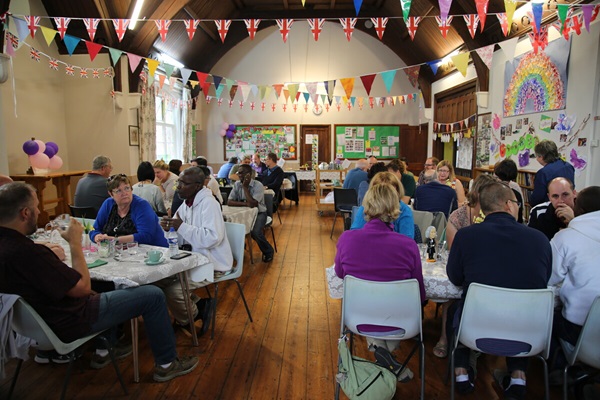Every time we confess our faith using the words of the Apostles' Creed, we say together:
We believe in the Holy Spirit,
the holy catholic church,
the communion of saints,
the forgiveness of sins,
the resurrection of the body,
and the life everlasting.
Who is the "communion of saints" we speak of in this ancient Christian creed?
To answer that question, we should consider two points of reference: the usage of the words involved in early Christianity and the context in which these words are used within the structure of this creed itself.
In Greek, transliterated into the Roman alphabet we use, the words are "agiōn koinōnian." The first word, agiōn, usually translated as "saints," is the word used widely by Christians simply to refer to other Christians. In Romans 1:7, Paul concludes his opening address to the Christians at Rome by referring to them as "those called saints." We see this kind of shorthand for Christians used nearly everywhere in the first several centuries, and still in some circles today. It does not refer to any "special Christians," or those who have had more exemplary lives than others. It just means those on whom the Holy Spirit has been outpoured through the gift of baptism.
We do not see these two words (agiōn koinōnian) next to each other, as we have them in the Apostles' Creed, in the New Testament as such. But we see enough close parallels with enough consistent use of these words apart from each other, even in the New Testament, that the sense is clear. The "fellowship of saints" are those other Christians with which one is in immediate relationship. It is pointing to the local church, the fellowship of Christians in a particular place and time.
The logic of the third article of the Apostles' Creed, quoted above, underscores this. As with the two articles before it (focused respectively on the Father and the Son), this article begins "I place my whole trust into..." It then moves from the most comprehensive (Holy Spirit) to the most particular (forgiveness of sins), and then back out to the more comprehensive (resurrection, life everlasting). The term "holy catholic church" refers to Christians "throughout the whole" (a literal translation of the Greek word katholikēn) of time and space. The "fellowship" or "communion of saints" is the expression of that "whole" reality of church in a particular time and place. It is explicitly within that community that we find ourselves most often experiencing the forgiveness of sins, because it is precisely against these people, with whom we are most regularly in contact, that we sin.
So, when we come to the observance of All Saints Sunday, the time of the year when we may talk most about "the communion of saints," the early church and the Apostles' Creed in particular would remind us that what we are really talking about is the community or communion of all Christians we know and interact with most deeply, those of our own local church. This is why so many of our congregations take time in worship that day to remember those within the local church family and those they love who have died in the previous year. Those we remember have been for us, and we for them, an integral part of the communion of saints with whom we have learned the grace and power of forgiveness, and with whom we hope to be resurrected to the life of the age to come.
This content was produced by Ask The UMC, a ministry of United Methodist Communications.





